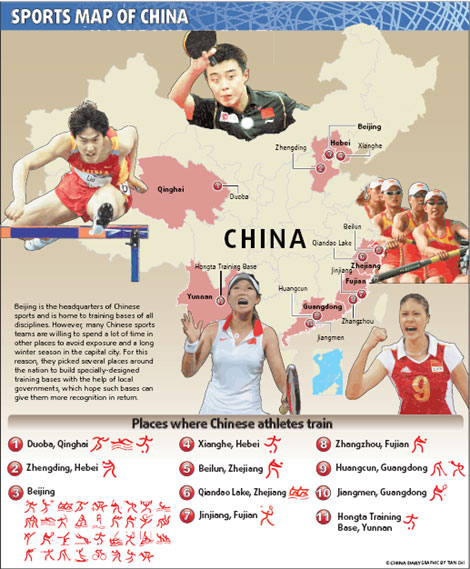China has several world-class sports training facilities around the nation, many of which have helped lay the foundation for China's Olympic success.
The following eight facilities are some of the best-known training bases in China and have produced some of the country's most talented and decorated athletes:

Duoba
Duoba, China's best high-altitude training base and one of the best in the world, is known both as the "Cradle of World Champions" and a "Factory of Gold Medalists".
Located in Huangzhong county on the Qingzang Plateau in China's northwestern Qinghai province, it sits 2,365m above sea level where the annual average temperature is 6.5 C above zero. It has been the training ground for China's national swimming team, shooting team and track and field team since the 1990s.
The Duoba training base has spawned a large arsenal of Chinese world champions and Olympic stars over the past two decades. The best known bunch is the legendary Chinese long-distance running group "Ma's Team", which won four gold medals, two silvers and two bronzes at the 1993 Stuttgart World Championships.

Lin Dan
|
Xing Huina, the 2004 Athens Games women's 10,000m gold winner, also attributes her triumph four years ago to Duoba's unique geological position.
Duoba used to be a military factory warehouse. In 1982, The Qinghai Sports Bureau acquired the base and transformed it into a state-of-the-art training complex. The Beijing and Qinghai governments have invested more than 2 billion yuan ($291 million) in reconstructing the facility over the past 20 years.
Other sports that train at Duoba include archery, soccer, basketball, badminton, volleyball, table tennis, judo, wrestling, and taekwondo.
Qiandao Lake
The name of Qiandao Lake, which translates to "Thousand-Islands Lake", explains its unique charm.
The training base lies deep in the heart of the world-famous Qiandao Lake tourism resort. It is 129km from the eastern Chinese city of Hangzhou, Zhejiang province. The resort's name comes from the 1,078 islands sprinkled across the area's 573 sq km of water surface.
The water region is not a natural creation, however. It was formed by the construction of a hydropower station in 1959.
The surrounding forest keeps the region's weather warm and humid all year long. The average temperature is a stable 17 C.
Rowing coach Zhang Guiting discovered the secluded water area. He was impressed by the tranquility of the area and its wide variation of water conditions, making it ideal for rowing and canoe training.
In 2000, the national rowing team was looking for an appropriate place to train athletes for the 2004 Athens Games. The team was informed of the training base, which the Zhejiang sports bureau had bought for 1.64 million yuan in 1999.
The General Administration of Sport invested another 50 million yuan to overhaul Qiandao Lake, adding world-class canoeing and rowing apparatuses for the team's training.
As athletes sweat during practice, the training base's natural beauty helps relieve some of the psychological pressure brought on by the repetitive and sometimes tedious training.
In 2004, Meng Guanliang and Yang Wenjun, both coached and trained in Qiandao Lake, won China's first-ever Olympic canoeing gold.
Jinjiang
For many Chinese, the image of Jinjiang, a small town in southern China's Fujian province, is more associated with the sports footwear industry than the badminton team's training base. The national team has trained at Jinjiang for the past six years. It was built on donations from expatriate Chinese from the town.